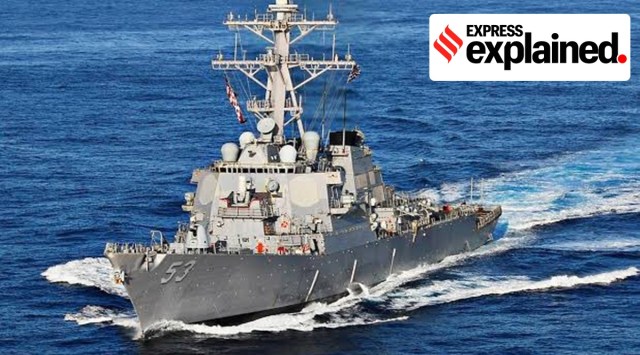- India
- International
Explained: Freedom of Navigation Operations, US’s 7th Fleet and India’s EEZ
The US Navy announced on April 7 that the USS John Paul Jones from its 7th Fleet had "asserted navigational rights and freedoms inside India’s exclusive economic zone, without requesting India’s prior consent".
 The USS John Paul Jones
The USS John Paul JonesThe US Navy announced on April 7 that the USS John Paul Jones from its 7th Fleet had “asserted navigational rights and freedoms approximately 130 nautical miles west of Lakshadweep Islands, inside India’s exclusive economic zone, without requesting India’s prior consent, consistent with international law”. It said “India requires prior consent for military exercises or maneuvers in its exclusive economic zone or continental shelf, a claim inconsistent with international law”, and the “freedom of navigation operation (“FONOP”) upheld the rights, freedoms, and lawful uses of the sea recognized in international law by challenging India’s excessive maritime claims”.
The Ministry of External Affairs responded that the government’s stated position on the UN Convention on the Law of the Sea (UNCLOS) “is that the Convention does not authorise other States to carry out in the Exclusive Economic Zone and on the continental shelf, military exercises or manoeuvres, in particular those involving the use of weapons or explosives, without the consent of the coastal state”.
Newsletter | Click to get the day’s best explainers in your inbox
FONOP: Simply put, the Freedom of Navigation Operations involves passages conducted by the US Navy through waters claimed by coastal nations as their exclusive territory. According to the US Department of Defense (DoD), the FON Program has existed for 40 years, and “continuously reaffirmed the United States’ policy of exercising and asserting its navigation and overflight rights and freedoms around the world”. The DoD says these “assertions communicate that the United States does not acquiesce to the excessive maritime claims of other nations, and thus prevents those claims from becoming accepted in international law”.
While this is not the first time something like this has happened, this is the first time the US Navy has issued a public statement giving details of the operation. Usually, in the past, the DoD has mentioned all FONOP challenges and assertions in its annual report to Congress.

7TH FLEET: It is the largest of the US Navy’s forward deployed fleets. According to its website, “at any given time there are roughly 50-70 ships and submarines, 150 aircraft, and approximately 20,000 Sailors in Seventh Fleet”, which is commanded by a 3-star Navy officer.
India had a close encounter with the 7th fleet during the 1971 war with Pakistan. According to military historian Srinath Raghavan, US President Richard Nixon and Henry Kissinger “believed that there was an outside chance for a ceasefire before the Pakistan army caved in on the eastern front”. Nixon instructed his Chief of Navy “to assemble an impressive naval task force and move it off the coast of South Vietnam, into the Malacca Straits, and onward to the Bay of Bengal”. Task Group 74 included the largest aircraft carrier in the US navy, the USS Enterprise. (1971: A Global History of the Creation of Bangladesh)
EEZ: According to UNCLOS, the EEZ “is an area beyond and adjacent to the territorial sea, subject to the specific legal regime” under which “the rights and jurisdiction of the coastal State and the rights and freedoms of other States are governed by the relevant provisions of this Convention”.
As per India’s Territorial Waters, Continental Shelf, Exclusive Economic Zone and Other Maritime Zones Act, 1976, the EEZ of India “is an area beyond and adjacent to the territorial waters, and the limit of such zone is two hundred nautical miles from the baseline”. India’s “limit of the territorial waters is the line every point of which is at a distance of twelve nautical miles from the nearest point of the appropriate baseline”. Under the 1976 law, “all foreign ships (other than warships including sub-marines and other underwater vehicles) shall enjoy the right of innocent passage through the territorial waters”, innocent passage being one that is “not prejudicial to the peace, good order or security of India”.
More Explained
EXPRESS OPINION
Apr 20: Latest News
- 01
- 02
- 03
- 04
- 05








































